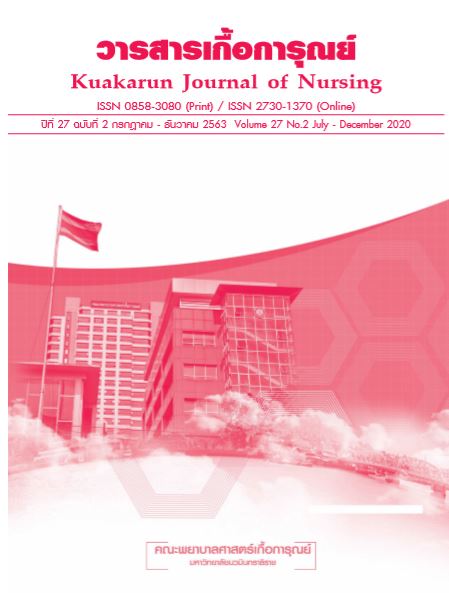ผลของโปรแกรมส่งเสริมการดูแลตนเองต่อพฤติกรรมการดูแลตนเองของพระสงฆ์ที่มีภาวะเมตาบอลิกซินโดรมในกรุงเทพมหานคร
คำสำคัญ:
โปรแกรมส่งเสริมการดูแลตนเอง, เมตาบอลิกซินโดรม, พฤติกรรมการดูแลตนเอง, พระสงฆ์บทคัดย่อ
การวิจัยกึ่งทดลองแบบสองกลุ่มวัดก่อนและหลังการทดลองนี้มีวัตถุประสงค์เพื่อศึกษาผลของโปรแกรมส่งเสริมการดูแลตนเองต่อพฤติกรรมการดูแลตนเองของพระสงฆ์ที่มีภาวะเมตาบอลิกซินโดรมในกรุงเทพมหานคร กลุ่มตัวอย่างคือพระสงฆ์ที่มีภาวะเมตาบอลิกซินโดรมและจำวัดอยู่ในกรุงเทพมหานครจำนวน 60 ราย แบ่งเป็นกลุ่มทดลอง 30 ราย และกลุ่มเปรียบเทียบ 30 ราย โดยกลุ่มทดลองได้รับโปรแกรมส่งเสริมการดูแลตนเอง ระยะเวลา 6 สัปดาห์ ซึ่งประยุกต์ใช้ทฤษฎีความพร่องในการดูแลตนเองของโอเร็ม ประกอบด้วย 1) การสร้างความตระหนักรู้ในการดูแลตนเอง 2) การตั้งเป้าหมายและการวางแผน 3) การให้ความรู้และการฝึกทักษะการดูแลตนเอง 4) การติดตามทางโทรศัพท์ เพื่อให้คำแนะนำปรึกษาและการให้ข้อมูลย้อนกลับ และ 5) การแลกเปลี่ยนเรียนรู้ภายในกลุ่มและการประเมินผลการดูแลตนเอง กลุ่มเปรียบเทียบได้รับการดูแลตามปกติ ทำการเก็บรวบรวมข้อมูลก่อนและหลังการทดลองด้วยแบบสัมภาษณ์พฤติกรรมการดูแลตนเองและแบบบันทึกข้อมูลการตรวจร่างกายและโลหิต แบบสัมภาษณ์พฤติกรรมการดูแลตนเองผ่านการตรวจสอบความตรงเชิงเนื้อหาได้ดัชนีความตรงเชิงเนื้อหาเท่ากับ .92 และตรวจสอบความน่าเชื่อถือได้สัมประสิทธิ์อัลฟาของครอนบาค เท่ากับ .76 วิเคราะห์ข้อมูลโดยใช้สถิติไคสแคว์ และสถิติทดสอบที
ผลการวิจัยพบว่า พระสงฆ์กลุ่มทดลองมีคะแนนเฉลี่ยพฤติกรรมการดูแลตนเองดีกว่าก่อนการทดลอง และดีกว่ากลุ่มเปรียบเทียบอย่างมีนัยสำคัญทางสถิติ (p < .05) และมีค่าเฉลี่ย น้ำหนักตัว ดัชนีมวลกาย เส้นรอบเอว ความดันโลหิต น้ำตาลขณะอดอาหาร และแอลดีแอล-คอเลสเตอรอล ดีกว่าก่อนการทดลองอย่างมีนัยสำคัญทางสถิติ (p < .05) อย่างไรก็ตาม ไม่พบความแตกต่างของค่าเฉลี่ยแอชดีแอล-คอเลสเตอรอล และไตรกลีเซอไรด์ภายหลังการทดลอง ข้อเสนอแนะคือ พยาบาลเวชปฏิบัติชุมชนควรนำโปรแกรมนี้ไปใช้เพื่อส่งเสริมการดูแลตนเองในกลุ่มพระสงฆ์ที่มีภาวะเมตาบอลิกซินโดรมหรือโรคเรื้อรังอื่น ๆ
เอกสารอ้างอิง
Ekphalakon W, Porapakkham Y, Thaniphanitsakun S, Phakcharoen H, Sathiannopphakao W, ThathaiKla K. The
th public health survey by physical examination 2008-2009. Nonthaburi: The Graphico Systems; 2010. (in Thai)
Alberti KG, Eckel RH, Grundy SM, Zimmet PZ, Cleeman JI, Donato KA, et al. Harmonizing the metabolic
syndrome: a joint interim statement of the International Diabetes Federation Task Force on Epidemiology and
Prevention; National Heart, Lung, and Blood Institute; American Heart Association; World Heart Federation;
International Atherosclerosis Society; and International Association for the Study of Obesity. Circulation
;120(16):1640-45.
Lapthananon P. Buddhist health 2012. Bangkok: Charansanitwong Printing; 2013. (in Thai)
Department of Medical Services, Ministry of Public Health. Annual report 2017, Department of Medical
Services, Ministry of Public Health. Nonthaburi: Department of Medical Services, Ministry of Public Health;
(in Thai)
Ekphalakon W. Report of the 5th Thai health survey by physical examination 2014. Bangkok: Aksorn Graphic &
Design; 2014. (in Thai)
Bureau of Health Promotion, Department of Health. Annual report, department of health 2014. Nonthaburi:
Division of Planning, Department of Health; 2014. (in Thai)
Suwannasi S. Creating peace in society: a study of the integrative approach of buddhism and christianity in the
northeast [Dissertation]. Maha Sarakham: Mahasarakham University; 2009. (in Thai)
Orem DE. Nursing: concepts and practice. 6th ed. St. Louis, MO: Mosby Year Book; 2001.
Grundy SM, Cleeman JI, Daniels SR, Donato KA, Eckel RH, Franklin BA, et al. Diagnosis and management of the
metabolic syndrome: an American Heart Association/national heart, lung, and blood institute scientific
statement. Circulation 2005;112(17):2735-52.
Peerayut R, Triumchaisri SK, Pramuk O, Vorakamol B, Orawan K. The effect of meditation to reducing Body
Mass Index (BMI) and hypercholesterolemia among registered nurses in Suphan Buri Province. Journal of
Thai Traditional and Alternative Medicine 2017;15(2):222-34. (in Thai)
Praphasin A, Watthana C, Tharavanij T. The effect of a self-management competency promoting program on
self-management behaviors, obesity, risk of cardiovascular disease and recovery from metabolic syndrome in
people with metabolic syndrome. Nursing Journal 2013;40(1): 34-48. (in Thai)
Posri S. The effect of nursing practice on the prevention of metabolic syndrome that applied the change
process on food consumption behavior and exercise for risk groups [Dissertation]. Nakhonpathom: Mahidol
University; 2016. (in Thai)
Buakaeo WT. The effect of self-management promotion program on dietary behavior and body mass index of
obese elderly monks [Dissertation]. Chonburi: Burapha University; 2012. (in Thai)
Chinakhom S, Siriphitthayakhunkit A, Phanphakdi A. The effect of a program to promote body energy balance
on self-care behavior and body proportions in women at risk for metabolic syndrome. Ramathibodi Nursing
Journal 2014;20(1):112-26. (in Thai)
Yang SJ, Chee YK, Kim JA, An J. Metabolic syndrome and its related factors among Asian immigrant women in
Korea. Nursing and Health Sciences 2014;16(3):373-80.
Sheard NF, Clark NG, Brand-Miller JC, Frang MJ, Pi-Sunyer FX, Mayer-Davis E, et al. Dietary carbohydrate
(amount and type) in the prevention and management of diabetes. Diabetes Care 2004;27(9):2266-71.
Coghill N, Cooper AR. The effect of a home-based walking program on risk factors for coronary heart disease
in hypercholesterolaemic men. A randomized controlled trial. Preventive Medicine 2008;46(6):545-51.
Grundy SM, Brewer HB Jr, Cleeman JI, Smith SC Jr, Lenfant C, National Heart, Lung, and Blood Institute, et al.
Definition of metabolic syndrome: report of the National Heart, Lung and Blood Institute/American Heart
Association conference on scientific issues related to definition. Circulation 2004;109(3):433-8.
Panyachotikun O, Satkong S, Sriwisit S. Effects of SKT meditation therapy for lowering blood pressure level of
patients with hypertension in Sikao Hosptial, Trang Province. The Southern College Network Journal of
Nursing and Public Health 2017;4(2):245-55. (in Thai)
Sanchai A, Pothiban L, Nanasilp P. Effect of Thai Qigong meditation exercise on Hemoglobin A1c level of the
elderly with type 2 diabetes mellitus. Nursing Journal 2011;38(4):65-80. (in Thai)
Chaiopanont S. Hypoglycemic effect of sitting breathing meditation exercise on type 2 diabetes at Wat Khae
Nok Primary Health Center in Nonthaburi province. Journal of Medical Association of Thailand 2008;91(1):
-8.
Wongsuwan P, Thiangtham W, Powwattana A, Nanthamogkolchai S. Health promotion program for
complications prevention among older persons with hypertension in Bangkok metropolitan. Journal of Public
Health Nursing 2014;28(3):145-60. (in Thai)
Phonghan P, Suntayakorn C, Prachanban P, Wannapira W. Effects of health promotion program on metabolic
syndrome preventive behaviors among health volunteers. Journal of Nursing and Health Sciences
;5(3):54-64. (in Thai)
Jopa R. The effect of self-management program on metabolic control behavior in middle aged people. Journal
of Health Science Research 2011;4(2):36-45.
Chaimongkol N, Pratanaphon S. Effects of continuous and accumulated brisk walking on functional capacity
and lipid profile in sedentary workers. Journal of Medical Technology and Physical Therapy 2011;23(2):177-85.
(in Thai)
Mestek ML. Physical activity, blood lipids, and lipoproteins. American Journal of Lifestyle Medicine
;3(4):279-83.
Surat L. The effects of Qi Gong, damnoen stick exercise and healthy food on blood lipid level in personnel of
damnoensaduak hospital. Region 4-5 medical journal 2011;30(3):239-47. (in Thai)
ดาวน์โหลด
เผยแพร่แล้ว
รูปแบบการอ้างอิง
ฉบับ
ประเภทบทความ
สัญญาอนุญาต
ลิขสิทธิ์ (c) 2020 วารสารเกื้อการุณย์

อนุญาตภายใต้เงื่อนไข Creative Commons Attribution-NonCommercial-NoDerivatives 4.0 International License.

















